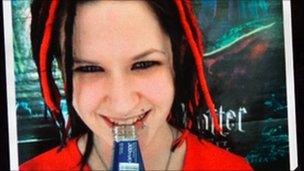Hate crime: Police record attacks on punks, emos and goths
- Published

Twenty-year-old goth Sophie Lancaster was kicked and stamped on by youths in a Bacup park
A police force has begun recording attacks on members of subcultures, such as goths and emos, as hate crimes.
Greater Manchester Police (GMP) is the first force in the UK to treat the offences in such a way.
Previously hate crimes were only registered for offences against race, religion, disability, sexual orientation or transgender identity.
GMP has worked with a charity set up following the murder of 20-year-old goth Sophie Lancaster in 2007.
Ms Lancaster was attacked in a park in Bacup, Lancashire, on 24 August 2007, along with her boyfriend Robert Maltby, because of the way they were dressed.
She was kicked and stamped on as she cradled her badly beaten boyfriend.
While Mr Maltby made a partial recovery from his injuries, Ms Lancaster slipped into a coma after the attack and died later in hospital
'Major breakthrough'
After her death, family and friends set up the Sophie Lancaster Foundation.
Mother Sylvia Lancaster: People in subcultures are creative people
The charity campaigns to change attitudes in society towards people who may have a different lifestyle or appearance.
The foundation has been working with GMP to educate officers.
Ms Lancaster's mother Sylvia said: "I think [what the police are doing] will make a vast difference. We're finding people are coming to us and saying since we started our campaigns they feel safer."
BBC home affairs correspondent Tom Symonds said offences motivated by hatred for the victim's race, religion, sexual orientation, disability or transgender identity could receive higher sentences.
But, our correspondent said, without a change in legislation, police in Greater Manchester can do little more than record subculture hate as an element in a crime.
The force says by becoming the first to do so it will raise awareness of the problem.
Assistant Chief Constable Garry Shewan said this new understanding of hate crime was a "major breakthrough", adding: "This means that we can recognise the impact that alternative subculture hate crime has on its victims and the wider community.
"Any crime motivated by hate is an insidious and evil crime and I hope other forces will follow our lead.
"We need to make a stance here and say clearly, in memory of Sophie, protecting the victims of hate crime should extended beyond those the law already safeguards."
However, former director of public prosecutions, Lord Macdonald, said he had reservations about changing the legal definition of a hate crime.
He said: "People's racial origins, their religion, their sexual orientation, people's dignity in the face of disability - these have been lines in the sand with the law saying, look, these are crimes that threaten social cohesion as a whole and therefore national life.
"I'm a little cautious about watering down this concept."
Ryan Herbert and Brendan Harris, both from Bacup, were jailed for life in 2008 for Miss Lancaster's murder and for causing grievous bodily harm to Mr Maltby.
Sentencing them, Judge Anthony Russell QC said: "This was a hate crime against these completely harmless people targeted because their appearance was different to yours."
Goths emerged as a youth subculture in the early 1980s and the term was initially used to describe a form of music.
It has since evolved to encompass literature, art and fashion, with its exponents typically dressing in dark clothing.
A spokesman for GMP added: "You can let Greater Manchester Police know about an alternative subculture hate crime via the national True Vision on-line reporting form. Select 'other' as a category and write 'alternative subculture' in the box provided."
- Published4 April 2013
- Published6 April 2013
- Published4 April 2013
- Published8 July 2011